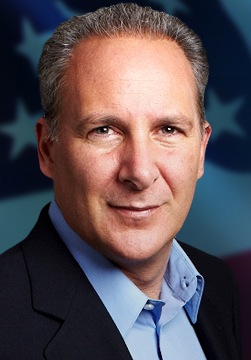Gold or Government, which do you believe?
Earlier this week, Wall Street Pollyannas reacted with glee to the release of seemingly mild producer and consumer prices data. While August PPI and CPI rose .6% and .5%, annualizing to 7.5% and 6% respectively, the completely meaningless, highly manipulated, "core" numbers, which have conveniently become the only figures making headlines, were far less alarming. According to the government, August "core" PPI was unchanged, while "core" CPI rose a scant .1%.
However, not to be fooled, the price of gold, considered by many to be the ultimate inflation indicator, rose to a new seventeen year high, gaining about ten dollars this week, and over twenty dollars in the last three. The Philadelphia Gold and Silver Index (XAU) gained about 7% on the week, bringing its three-week gain to 17%. Gold's recent surge confirms the break-out that I first wrote about on June 6th "Gold & Oil Could Force Surprise ECB Rate Hike" and again on June 17th "Gold's Trifecta Reveals Dollar's Diminished Status" available at:www.gold-eagle.com/editorials_05/schiff061705.html
As the price of Gold tends to rise in inflationary periods, economists should ask themselves if they believe the government or gold. History and recent anecdotal evidence certainly favor gold. On Thursday, the Philadelphia Fed's manufacturers report for September revealed that despite a sharp slowdown, its prices paid index surged 257 points to its highest reading since January. In addition, this week the national average price of unleaded gasoline breached the three dollar per gallon level for the first time ever, exceeding the inflation adjusted peak of $2.94 set back in 1981. Actually, today's average would be even higher if it reflected the same percentage of gas sold at full service prices as was the case 1981.
Also the week saw fresh releases of trade and current account deficit data. As an example of the power of diminished expectations, July's horrific $57.9 Billion trade deficit was greeted as good news, as it was less than the slightly more horrifying $60 billion that had been feared. The second quarter current account deficit, which came in at a higher than expected $195.7 billion, would have been a new all-time record, had it not been for the upward revision of the first quarter current account deficit to $198.7 billion. The $3 billion narrowing in the quarterly current account deficit (the first time since 2003) can hardly be seen as progress, as it resulted entirely from a $4.4 billion reduction in foreign aid. Widening trade and current account deficits will exert additional downward pressure on the dollar and upward pressure on consumer prices. Finally, President Bush's "Marshall Plan" for the Gulf Coast will only fuel inflation's fire, as the money needed to fund it will either be created by the Fed, or borrowed from abroad.
Perhaps the most important reason to be skeptical of government inflation numbers is that the government, like a fox campaigning to guard a hen house, has many reasons to be disingenuous. As the world's largest debtor, the Federal Government is inflation's primary beneficiary. More importantly, for America's bubble economy to continue expanding, politicians must keep consumers borrowing and spending. By transferring wealth from creditors to debtors, inflation helps makes this possible. For debtors, inflation reduces the real burden of debt service, while simultaneously increasing the prices of their assets, particularly their houses. Unfortunately for creditors, the vast majority of American voters are debtors, and monetary policy is therefore conducted specifically to benefit the latter. Considering the fact that so many creditors are foreigners, and therefore ineligible to vote, this amounts to a political no-brainer.
However, this policy can only "succeed" as long as the Government can con America's creditors into believing that inflation is not a threat, even as it creates it with increased veracity. Recent evidence suggests that this propaganda campaign is beginning to wear thin. This week's pronounced weakness in the bond market, despite soft economic data and "benign core" inflation numbers, reveals that more investors are getting wise to the con, and looking to gold rather than the government as a reliable indicator of inflation.
September 16, 2005
Peter D. Schiff
President/Chief Global Strategist
Euro Pacific Capital, Inc.

















